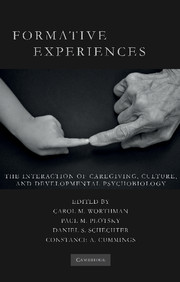Book contents
- Frontmatter
- Contents
- List of Figures
- List of Tables
- List of Contributors
- Foreword by Robert Sapolsky
- Preface
- List of Abbreviations
- Introduction
- SECTION ONE HISTORICAL, CROSS-CULTURAL, AND DEVELOPMENTAL SCIENCE PERSPECTIVES
- SECTION TWO HOW EXPERIENCE INTERACTS WITH BIOLOGICAL DEVELOPMENT
- SECTION THREE FORMATIVE RELATIONSHIPS WITHIN AND ACROSS GENERATIONS
- SECTION FOUR SOCIAL AND CULTURAL CONTEXTS OF CHILDHOOD DEVELOPMENT – NORMATIVE SETTINGS, PRACTICES, AND CONSEQUENCES
- SECTION FIVE FEAR, FUN, AND THE BOUNDARIES OF SOCIAL EXPERIENCE
- SECTION SIX PUBLIC HEALTH, EDUCATION, AND POLICY IMPLICATIONS
- Index
SECTION SIX - PUBLIC HEALTH, EDUCATION, AND POLICY IMPLICATIONS
Published online by Cambridge University Press: 26 May 2010
- Frontmatter
- Contents
- List of Figures
- List of Tables
- List of Contributors
- Foreword by Robert Sapolsky
- Preface
- List of Abbreviations
- Introduction
- SECTION ONE HISTORICAL, CROSS-CULTURAL, AND DEVELOPMENTAL SCIENCE PERSPECTIVES
- SECTION TWO HOW EXPERIENCE INTERACTS WITH BIOLOGICAL DEVELOPMENT
- SECTION THREE FORMATIVE RELATIONSHIPS WITHIN AND ACROSS GENERATIONS
- SECTION FOUR SOCIAL AND CULTURAL CONTEXTS OF CHILDHOOD DEVELOPMENT – NORMATIVE SETTINGS, PRACTICES, AND CONSEQUENCES
- SECTION FIVE FEAR, FUN, AND THE BOUNDARIES OF SOCIAL EXPERIENCE
- SECTION SIX PUBLIC HEALTH, EDUCATION, AND POLICY IMPLICATIONS
- Index
Summary
INTRODUCTION
So far, the materials in this book have delineated emerging understandings of development and its relations with experience. These insights lend specificity and weight to the significance of context for development, and provide a basis on which to conceptualize how differences or perturbations in context influence its course. From such a framework, we can then project the consequences for differential function and health. A guiding motive, then, is the support of developmental needs and the realization of human potential. From this orientation, translation from lab to living room, from systematic observation to informed action, and from mutual incomprehension to engaged empathy emerge as important practical goals. Case studies throughout the book have explored lessons learned about decisive developmental contexts, moments, and dynamics from clinical, cross-species, or cross-cultural encounters. The challenge is to scale up from this knowledge for application at the national and international level.
In this section, the challenge is confronted, key issues identified, and solutions suggested for promotion of optimal child development and welfare. The contributions also grapple with an issue long disregarded in developmental research, namely the failure to represent the full range of conditions under which children live and develop. The preponderance of research concerns populations in the affluent countries that conduct it; only a small fraction of our knowledge draws from the widely varied and often impoverished settings where the great majority of humanity lives and develops.
- Type
- Chapter
- Information
- Formative ExperiencesThe Interaction of Caregiving, Culture, and Developmental Psychobiology, pp. 503 - 504Publisher: Cambridge University PressPrint publication year: 2010



